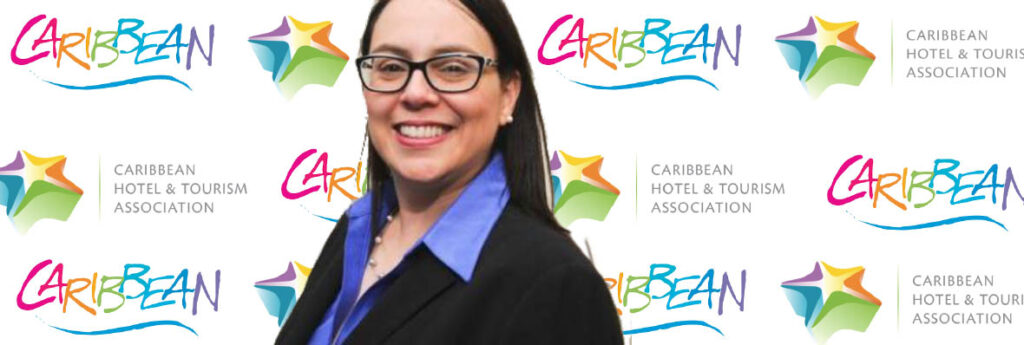Often subject to hurricanes, not to mention the varied whims of world events on its tourism-dependent economy – the Caribbean knows trouble. The COVID-19 pandemic, however, clearly rates as the region’s “biggest interruption ever,” according to officials at this year’s Caribbean Tourism Marketplace – a virtual event that Vanessa Ledesma says is nevertheless meant to show the world the region’s resilience and optimism, and that the Caribbean is emerging “stronger than ever.”
Ledesma, director general and acting CEO of the Caribbean Hotel & Travel Association (CHTA), opened the 39th annual event – postponed from January due to the pandemic – yesterday (May 11), noting that attendees include over 100 tourism buyers from 20 countries, including Canada; 100-plus Caribbean supplier companies from 24 Caribbean countries; and global media (including Travel Industry Travel).
She noted particular delight in the interest of so many buyers for the three-day conference, especially considering its delayed launch and non-traditional timing (it usually takes place at the start of the year) and also at time “when everybody is (busy) working on special offers and packages for the upcoming months, particularly Q3 and 4,” although, she added, “we know that there is still interest and desire in the summer coming up.”
Importantly, CHTA exec Karen Whitt, who is also VP of Hartling Group hotels in the Turks and Caicos, said that interest in the Caribbean is also extending to consumers. “We are seeing some of the best occupancy rates in the region at this time of the year,” she noted, adding, “Looking forward, we’re looking particularly strong for the summer and the immediate coming months are really filling up nicely. There’s very high occupancy… even into the winter. The confidence is back and people are happy.”
Ledesma acknowledged that booking trends, though strong, are also “all over the place” – a combination of “very last-minute bookings like we’ve never seen in the past, but, also, the festive season is already booking up, into Q1 (2022).
“I think as confidence grows, the traditional booking patterns, which tend to be 30-, 45-, 65-days out will start to trickle in. But right now people are waiting, waiting, waiting. They want to go, but they want to see what happens.”
Former CHTA executive and current advisor Frank Comito notes that longer-stay bookings are on also the rise, pointing to, for example, average stays in the Dominican Republic jumping from eight to 10 days. “That’s significant,” he says.
Comito reports that most visitors are coming from the US, particularly as vaccination rates there rise, telling Travel Industry Today, “We’re not getting the push on the Canadian market yet, and I think that’s because of their (government) travel policies, and as that opens up you’ll see (a flood of Canadians).”
On the subject of vaccination passports, Comito says the Caribbean adheres to the position of the World Travel & Tourism Council (WTTC), which is that “vaccine passports should not be a limiting factor in travel to anywhere.” However, as they develop, Comito foresees that they will be an “added vehicle for destinations to utilize,” though he says “hopefully as we achieve herd immunity in the many, many months to come, we won’t need any of this.”
Comito reports that Caribbean countries are producing vaccination rates ranging from about 30 to fully 100%, but also collectively some of the lowest infection rates in the world (617 per 100,000 – compared to 3,600 per 100k in Latin America and 9,000 in the US, for example), while tourism workers in many Caribbean countries also hold higher (but not the highest) priority status to receive the jabs.
“We’re exceeding expectations – we didn’t expect to be at this level (of vaccinations) thus far at this point. And that’s important to the recovery,” he adds.
All of which is to say, “There is much to be hopeful about and also much to be grateful for,” says CHTA president Pablo Torres.
“Gratitude,” he mused, “might very well be one of the world’s great lessons from the pandemic – gratitude and grateful for the ease of travel, something which the world perhaps took for granted before the pandemic, but now a world which better appreciates what it temporarily lost and longs to return to…”
Torres noted that before the pandemic, the Caribbean was on a 10-year growth curve (boasting 31 million overnight and 30 million cruise visitors in 2019) – a trend that was “disrupted” by the pandemic. But during the COVID interruption, he says, Caribbean countries undertook a major overhaul of product – from health and safety standards and training, to diversifying the accommodation sector, enriching culinary and cultural offerings, and improving infrastructure.
All of this bodes well for the region’s long-term growth and development.
“The fact that we are here (at CTM), speaks to the resiliency and optimism of the Caribbean, our people, our organization and our tourism industry,” says Torres. “We always come back (from disaster) – and we always come back better than the past.”

